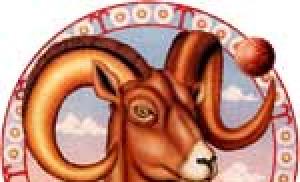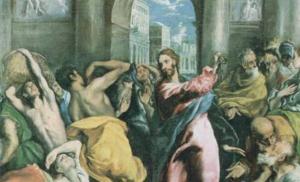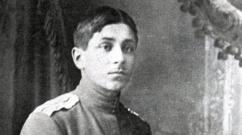The reign of Fyodor Ivanovich (1584-1598). The reign of Fedor Ivanovich Fedor 1584 1598 domestic and foreign policy
After the death of Ivan the Terrible, the royal throne was inherited by his eldest son Fyodor Ioannovich (1584-1598). But since he was weak and weak-minded from birth, according to the will of Tsar Ivan, a regency (guardianship) council was created under him, consisting of the five most influential members of the Boyar Duma: Prince Bogdan Yakovlevich Belsky, Prince Ivan Petrovich Shuisky, boyar Nikita Ivanovich Romanov, Prince Ivan Fedorovich Mstislavsky and boyar Boris Fedorovich Godunov. A number of historians (R. Skrynnikov), having revised their own previous ideas, began to argue that this guardianship council was originally “ seven-numbered“And in addition to the five influential boyars, it included two more prominent members of the Boyar Duma - the head of the State Prikaz, Okolnichy and Treasurer, Pyotr Ivanovich Golovin, and the head of the Ambassadorial Prikaz, Duma clerk Andrei Yakovlevich Shchelkalov.
It seems that in this case Professor R.G. Skrynnikov, being one of the most famous and authoritative specialists in the history of that period, absolutely correctly noticed one interesting detail, that many collegial bodies of ancient and medieval Rus' were precisely “ seven-numbered" And during the Time of Troubles, this “detail” will generally become the rule.
This body did not exist for long, since almost immediately a conflict began between its members. the most intense struggle for power (1584-1586), which was won by the tsar's brother-in-law, boyar Boris Fedorovich Godunov (1552-1605), who became the de facto ruler of the state. During the years of the co-ruling of Boris Godunov and Fyodor Ioannovich, a number of significant events took place in the country, both in domestic and foreign policy:
1) In 1587, skillful Russian diplomats led by the clerk of the Ambassadorial Prikaz, Andrei Yakovlevich Shchelkalov, managed to prolong the Yam-Zapolsky peace treaty with the Polish-Lithuanian Commonwealth, concluded in 1582, which was very important for a country extremely depleted by the oprichnina and the Livonian War.
2) In 1589, with the blessing of the Patriarch of Constantinople Jeremiah II, who was in Moscow, the patriarchate was established in Russia, and the first patriarch of the Russian Orthodox Church Boris Godunov's direct protégé and assistant, the current Moscow Metropolitan Job (1589-1605), was elected.
3) In 1589, Fyodor Ivanovich approved a new Code of Law, which was better systematized and somewhat expanded, taking into account the rich judicial practice, especially in terms of the land rights of black-sown peasants and the powers of the peasant community. The very origin and authorship of this Code of Law are still controversial, and a number of authors (M. Vladimirsky-Budanov, A. Smykalin) consider it either a bill that has not been put into effect, or a kind of manual for zemstvo judges in the conditions of the abolition of the previous feeding system.
4) In 1590-1593. Another Russian-Swedish war took place, as a result of which the Tyavzin Peace Treaty (1595) was signed, under the terms of which Russia regained Yam, Koporye, Ivangorod, Oreshek and other cities lost in the Truce of Plus (1583).
5) In 1591, in Uglich, under mysterious circumstances, the last representative of the Rurik dynasty, the youngest son of Ivan the Terrible, nine-year-old Tsarevich Dmitry, died. Historical tradition, coming from N.M. Karamzin, linked his death with the name of Boris Godunov, but this version is still considered unproven and rejected by many historians (R. Skrynnikov, V. Kobrin, V. Kozlyakov). Although, of course, the death of Tsarevich Dmitry played into the hands of Boris Godunov and opened up a direct path for him to the throne. Since within the framework of our course we cannot dwell on this problem in detail, we recommend that our reader turn to the work of the famous Soviet historian Professor V.B. Kobrin “To whom are you dangerous, historian” (1992), which details four different versions of the death of Tsarevich Dmitry.
Tsar Feodor Ivanovich(Fyodor Ioannovich, also Theodore the Blessed, years of life May 31, 1557 - January 7, 1598) - Tsar of All Rus' and Grand Duke Moscow from March 18, 1584 to 1598, son of Ivan the Terrible, the last representative of the Moscow branch of the Rurik dynasty.
Fyodor Ivanovich was a quiet and God-fearing monarch, incapable of public administration. The real power was with Boris Godunov, the Tsar's brother-in-law.
Main events of the reign
|
Elected to the throne by the Moscow Zemsky Sobor. Arkhangelsk was founded. |
|
|
The Tsar Cannon is cast. Samara and Tyumen were founded, Ufa was elevated to city status. Voronezh was founded on the Don; |
|
|
Tobolsk founded; |
|
|
The Moscow Patriarchate was established with the first Patriarch Job. Tsaritsyn was founded near the former capital of the Golden Horde, Sarai-Berke; |
|
|
Saratov founded; |
|
|
Construction completed White City Moscow; The Crimean Khan's raid on Moscow was repulsed. |
|
|
Stary Oskol founded |
|
|
The fortresses of Tara and Surgut were rebuilt on the western border of the Piebald Horde; |
|
|
The Russian-Swedish War of 1590-1595 ended, as a result of which Russia returned the previously lost lands and cities of Yam, Ivangorod, Koporye, Korela. Obdorsk was founded at the mouth of the Ob, and construction of the Babinovskaya road to Siberia began. |
In 1591 - the death of Tsarevich Dmitry “Uglich Affair”, the suppression of the male branch of the Moscow princely-royal house took place. There were two versions of the prince’s death: an accident, or he was killed with the sanction of Boris Godunov. Then, as a result of the “Miraculous Rescue,” the prince comes to life and False Dmitry appears on the stage, the Time of Troubles (time of troubles) begins.
The last Rurikovich, who inherited power, was weak in body and mind and could not rule the country, just as he could not have heirs. The reign of Fyodor Ivanovich fell on difficult years for Russia. The legacy of the great father remained in a disorderly state, which required urgent reforms.
General political situation
The reign of Ivan Vasilyevich ended under unfavorable conditions. Firstly, an unsuccessful war with Lithuania, and secondly, when fighting with the Swedes for free duty-free trade on the Baltic Sea, Russia not only did not get what it wanted, but lost part of its lands.
The oprichnina system undermined the economic power of the large aristocracy and physically exterminated its most prominent figures who could have been a support in the reign of Fyodor Ivanovich. St. George's Day was abolished, and the peasantry accumulated hatred towards the state, because they had to fulfill increasingly higher duties for patrimonial owners and landowners. State taxes also increased. The boyars and princes themselves, patrimonial owners, tried to humiliate the nobles and strengthen their own positions, to regain the influence lost under Grozny. The nobles fought against the dominance of the boyars.
Identity of the heir

There wasn't even a bridal show, which had been a long-standing tradition. Grozny just decided that. This marriage served as the first step in the rise of Boris Godunov. But Ivan IV foresaw that there might not be children in a marriage, so in this case, in his will, he ordered Fyodor to marry Princess Irina Mstislavskaya. However, the intrigues of Boris Godunov sent this princess to a monastery. At the age of 27, in 1584, the reign of Fyodor Ivanovich began.

But he did not change his habits - he still surrounded himself with holy fools, monks, and loved to climb the bell tower to ring the bells. Meanwhile, the country was waiting for action. Ivan IV established a guardianship council for his feeble-minded son, but the council members all quarreled, and political arena Shuisky and Godunov remained, who eventually won. Tsarevich Dmitry, who had no rights to the throne, was removed with his mother to Uglich. This was required to weaken the Nagih clan.
On the kingdom
When the board of trustees finally collapsed, the rapid rise of Boris Godunov, his brother, began. Cunning and efficiency made him the most influential person in the reign of Fyodor Ivanovich. He received the right to lead a horse during the king’s ceremonial rides. Then it was real power. According to the instructions of the “stable”, important royal decisions were made. Realizing the precariousness and unreliability of his position, Godunov sought support from the nobility. During the reign of Fyodor Ivanovich, at the instigation of Godunov, a five-year search period for fugitive peasants was established (decree of 1597), since the nobles, more than the patrimonial owners, suffered from the lack of people cultivating the land. Another gift was made to the nobles. The poorest landowners who worked the land themselves were exempt from paying taxes.
State position
During the reign of Fyodor Ivanovich (1584-1598), the economy began to be restored and the economic situation improved. Abandoned empty lands were plowed open. Godunov took away lands from the boyars and distributed them to landowners, thereby strengthening his position.

But only those who served were placed on the ground. Moreover, in 1593-1594 the legality of land ownership by monasteries was clarified. Those who did not have documents were deprived of their inheritance in favor of the sovereign. These lands could also be assigned to the townspeople and service people. Thus, Godunov relied on the poor and “thin-born”.
Church reform
In Moscow they believed that the dignity of the Russian Orthodox Church had been diminished. In 1588, the patriarch from Constantinople came to the capital and agreed to independence in church affairs, that is, the head of the Russian Orthodox Church from the metropolitan became the patriarch.

On the one hand, this kind of independence emphasized the prestige of Russian Orthodoxy, and on the other hand, it separated it from the world, delaying development and preventing the entry of new ideas. The patriarchate was formally elective, but in fact only one candidate was proposed, who was chosen - Job. The spiritual authorities were subordinate to the state and supported it in every possible way. Such a strengthening of secular power occurred during the reign of Tsar Fyodor Ivanovich.
Completion of the conquest of Siberia
The beginning was made by the Stroganov merchants, who called Ermak for help. After his death, the remnants of his detachment left Siberia, but in 1587 Moscow sent help, and the city of Tobolsk was founded. The movement to the East continued under the rule of Fyodor Ivanovich and Boris Godunov.
Little War in the West
The Baltic Free Trade War began in 1590 and ended five years later. This allowed Godunov to return Russian cities on the Finnish shores and make trade with Sweden lively, which brought him popularity among Russian merchants.
The southern borders were also strengthened, and the Crimean Tatars no longer annoyed Moscow since 1591. In the north, in Arkhangelsk, a new White Sea trade was opened in 1586. The country gradually grew richer and lived relatively quietly, so chroniclers recalled the times when there was “great silence” in Moscow.
Despite the weakness of the sovereign, the years of rule, thanks to Godunov’s smart policies, were successful. In 1598, blessed Tsar Feodor died. He was forty years old. He left no heirs, and with him the
Fyodor I Ioannovich (or Fyodor the Blessed) - (born May 31, 1557 - death January 7 (17), 1598) - Tsar of All Rus' and Grand Duke of Moscow (1584 - elected to the throne by the Moscow Zemsky Council). From the family of Moscow Grand Dukes, the son of Tsar Ivan IV Vasilyevich the Terrible and Tsarina Anastasia Romanovna Yuryeva-Zakharova. The last of the Rurik family. 1584 - 1598 years of the reign of Fyodor Ioannovich. He was a candidate for the Polish throne in 1573, 1576 and 1577. He married Irina Fedorovna Godunova in 1580.
Early years. Characteristic
Was born future king in 1557 in the Sobilka tract, Pereslavl-Zalessky. At the age of three he lost his mother, his childhood and adolescence fell on the darkest years. Morbidity and features of degeneration were generally characteristic of the offspring. Katyrev-Rostovsky wrote that Fyodor “was a noble fool from his mother’s womb,” and the bloody horrors and wild amusements of the Aleksandrovskaya Sloboda, without a doubt, could have disfigured the psyche healthy child.
None of the chroniclers and memoirists cite facts of obvious insanity and inappropriate behavior of the prince, although many foreigners reported his dementia as something generally known. The Swedish king Johan even said in his speech from the throne that the Russian tsar was half-witted and that “the Russians in their language call him durak.” The Roman envoy Possevino called the tsar “almost an idiot,” the English ambassador Fletcher “simple and weak-minded,” and the Polish ambassador Sapieha reported to his monarch: “He has little sense, or, as others say and as I myself noticed, none at all. When, during my presentation, he sat on the throne in all the royal decorations, then, looking at the scepter and the orb, he kept laughing.”
Possible causes of dementia
Perhaps the prince suffered from some form of autism, but, most likely, his personality simply did not develop - it could have been a kind of mental self-defense against his father’s despotism and the nightmares of the surrounding reality. Fyodor had before his eyes the example of his older brother: the active and strong-willed Ivan Ivanovich had to take part in the bloody games of his parent, sometimes he dared to contradict him - and we know what this strength of character led to. It was safer to abandon character altogether.
Description of appearance
The prince was slow in his movements and speeches, there was nothing royal in his appearance and behavior. “The current king, in relation to his appearance, his height, is small, squat and plump, of a weak physique and inclined to be watery,” said Fletcher. – His nose is like a hawk, his step is unsteady due to some kind of relaxation in his limbs; he is heavy and inactive, but he constantly smiles, so that he almost laughs.”
The frail body could not withstand the weight of the royal ceremonial vestments; Monomakh's hat was too big for his disproportionately small head. During the coronation, Fyodor Ioannovich was forced, without waiting for the end of the long ceremony, to remove the crown and hand it over to the first boyar, Prince Mstislavsky, and gave the golden orb (the royal “apple”) to Godunov, which, of course, was a shock to the superstitious public and was perceived by them as a symbolic renunciation of real power.

Tsar Fyodor Ioannovich puts a gold chain on Boris Godunov
Religiosity
WITH early years Fyodor Ioannovich found consolation and refuge only in religion. He was distinguished by deep and devout piety, he could stand for hours at church services, prayed for a long time, loved to ring the bells himself and showed interest only in spiritual conversations (proof that he was not an idiot). This excessive piety irritated Ivan Vasilyevich, who called the young man “a sexton’s son.”
The reign of Fyodor Ioannovich
During the reign of Fyodor Ioannovich, Moscow was decorated with new buildings. China Town has been updated. In 1586-1593, another powerful defensive line was built in the capital from brick and white stone - the White City.
I also remember the reign of Fyodor Ioannovich, the establishment of the Moscow Patriarchate. After the baptism of Rus', the Metropolitan was the main representative of the church in the state. He was appointed Byzantine Empire, considered the center of Orthodoxy. But in 1453, the Muslim Turks captured Constantinople and this state was destroyed. Since that time, debates have not stopped in Moscow about the need to create its own patriarchate.
In the end, this issue was discussed between Boris Godunov and the Tsar. The adviser briefly and vividly described to the sovereign the benefits of the emergence of his own patriarchy. He also proposed a candidacy for the new rank. He became Metropolitan Job of Moscow, who was a faithful associate of Godunov for many years.
During the reign of Theodore the Blessed, it was possible to end the Livonian War, not without profit (by the way, the sovereign himself took part in the campaign) and to win back everything lost; strengthen in Western Siberia and the Caucasus. Large-scale construction of cities (Samara, Saratov, Tsaritsyn, Ufa, Kursk, Belgorod, Yelets, etc.) and fortifications in Astrakhan and Smolensk was launched.
However, during his reign, the situation of the peasants changed sharply for the worse. Around 1592, peasants were deprived of the right to move from one master to another (St. George's Day), and in 1597 a royal decree was issued on a 5-year search for fugitive serfs. A decree was also issued that prohibited enslaved people from ransoming for freedom.

Reconstruction of the appearance of Fyodor Ioannovich (M. Gerasimov)
Daily life
Having become sovereign and freed from his father's oppression, Feodor I began to live as he liked.
The autocrat got up before dawn to pray to the saints commemorated on that day. Then he sent to the queen to ask if she slept well. After some time, he himself appeared to her, and they went with her to stand at Matins. Then he talked with the courtiers, whom he especially favored. By nine it was time for mass, which lasted at least two hours, and then it was already time for lunch, after which the king slept for a long time. After - if not fasting - it was time for entertainment. Waking up long after noon, the sovereign leisurely steamed in the bathhouse or amused himself with the spectacle of a fist fight, which at that time was considered a non-violent pleasure. After the vain, one should pray, and the sovereign advocated vespers. Then he retired with the queen until a leisurely dinner, during which he had fun with buffoonery and bear-baiting.
Every week the royal couple necessarily went on tireless pilgrimages to nearby monasteries. Well, those who along the way tried to approach state affairs, the “autocrat” sent to the boyars (later - to Godunov alone).
Manifestation of character
But for all his lack of will, for all his gentleness and complaisance, the tsar at times showed inflexibility, which led to serious state consequences. These bouts of stubbornness manifested themselves when someone tried to encroach on the sovereign’s private life, or more precisely, on his relationship with his wife, whom Fyodor loved very much.
He believed that he could arrange the matrimonial fate of his children at his own discretion. At his whim, he divorced his eldest son twice, and he was forced to obey. But when Ivan IV decided to separate the seemingly weak-willed Fyodor from Irina, who could not give birth to offspring, he encountered inexorable resistance - and he had to retreat. The only harsh act of the monarch during his reign was the disgrace that he brought down on the boyars and the metropolitan when they also tried to divorce the king from his wife.

Irina Fedorovna Godunova. Sculptural reconstruction based on the skull (S. Nikitin)
Irina Fedorovna. The role of the Godunovs
Irina Fedorovna Godunova, Boris’s sister, did not strive for power - on the contrary, she tried in every possible way to distance herself from it - but at the same time she had the opportunity to play an important role in Russian history. She was 5 or 6 years old younger than Boris and was the same age as Fedor. Like her brother, she grew up at court, under the care of her uncle Dmitry Ivanovich Godunov, who, at the time of greatest favor, in 1580, arranged his niece as a bride to the younger prince. The marriage, however, was of dubious benefit, because the sickly Fyodor had no significance at all at court. Most likely, this marriage promised big troubles in the future. Upon ascending the throne, the new tsar (and he was supposed to be Ivan Ivanovich) as a rule mercilessly dealt with his closest relatives, and dementia would hardly have saved his brother - just as it did not save the equally harmless Vladimir Staritsky.
But fate decreed that Irina became a queen - and not a “temple” queen, that is, doomed to be locked up, but a real one. Because Fyodor was unrepresentative and behaved strangely at official ceremonies or avoided them altogether, Irina was forced to sit in the Boyar Duma and receive foreign ambassadors, and in 1589, during an unprecedented event, the visit of the Patriarch of Constantinople, she even addressed to a distinguished guest with a welcoming speech - this has not happened in Moscow since the times and will not happen again for another century, right up to the ruler Sofia Alekseevna.
In the first, “non-royal” period of his reign, he held on through friendship and kinship with the queen, who obeyed his advice in everything. At that time, the boyar could hardly think about taking the throne himself, and pinned his hopes for the future on the regency under the heir, whose birth had been awaited for a long time and in vain.
The fact is that Fyodor Ioannovich, although weak, was, as they said then, not “childless.” Irina was often pregnant, but the children were born dead. (A study of the queen’s remains, which was carried out during Soviet times, discovered a pathology in the structure of the pelvis, which made childbearing difficult.)
1592 - Irina was still able to give birth to a living baby - however, a girl. In those days, the system of power did not provide for female autocracy, but there was hope for saving the dynasty. They immediately began to select a future groom for the little princess Feodosia, about which negotiations were started with the most authoritative court in Europe - the imperial court. The Viennese ambassador was asked to send some little prince to Moscow in order to teach him the Russian language and customs in advance. But the girl was born weak and died before she was one and a half years old.

Saint Job, Patriarch of Moscow and All Rus'
Death of the King
At the end of 1597, Fyodor the Blessed became seriously ill. He gradually lost his hearing and vision. Before his death, he wrote a spiritual letter, which indicated that the power should pass into the hands of Irina. Two main advisers to the throne were appointed - Patriarch Job and the Tsar's brother-in-law Boris Godunov.
1598, January 7 - at one o'clock in the afternoon the sovereign died, unnoticed, as if he had fallen asleep. Some sources claim that the monarch was poisoned by Boris Godunov, who wanted to take the throne himself. When examining the king's skeleton, arsenic was discovered in his bones.
The fatal illness of the last tsar from the Moscow Rurik dynasty caused a commotion at court. Everyone had no time for ceremonies - a brutal struggle for power began, so the king died almost alone. Before his death, he was not even tonsured into the schema. The opening of the sarcophagus showed that the Tsar of All Rus' was buried in some kind of shabby caftan, with a simple, not at all royal myrrh (vessel for ointment) at the head. Fyodor took great care of himself: his nails, hair and beard were carefully trimmed. Judging by the remains, he was stocky and strong, noticeably shorter than his father (about 160 cm), his face was very similar to him, the same Dinaric anthropological type.
With his death, the ruling Rurik dynasty ceased to exist. In the popular consciousness, he left behind a good memory as a merciful and God-loving monarch.
After the death of her husband, Irina Fedorovna refused the offer of Patriarch Job to take the throne and went to the monastery.
FEDOR IVANOVYCH(05/31/1557-01/06/1598) - Tsar since March 1584, the last Russian sovereign from the Rurik dynasty.
Son of Tsar Ivan IV the Terrible and Anastasia Romanovna Zakharyina-Yuryeva. Since 1573, he was repeatedly nominated as a candidate for the Polish throne. After the death of his eldest son Ivan at the hands of Ivan IV (1582), Fyodor became the de facto heir to the throne, although his father considered him incapable of governing the state. Before his death, Ivan IV established a regency council to help Fedor from among the most influential boyars and two Duma clerks - the Shchelkalov brothers.
The first years of Fyodor Ivanovich's reign were marked by a fierce struggle between palace factions. According to contemporaries, Fyodor Ivanovich paid little attention to state affairs. He devoted most of his time to palace management, decorating the Kremlin chambers, and made generous contributions to monasteries. The king's favorite pastime was bear fights.
Since 1587, power in the country was actually concentrated in the hands of boyar B.F. Godunov, whose sister, Irina, was married to Fyodor Ivanovich. The years of Fyodor Ivanovich's stay on the throne were characterized by a gradual improvement in economic life, which was in a state of crisis after the Livonian War of 1558-1583. The Godunov government took a number of measures to further enslave the peasants (introduction of fixed-term years, etc.) and increase the tax burden of the draft population - the main source of replenishment of the treasury.
Characterized by certain successes foreign policy this period. As a result of the war with Sweden 1590-1593. Russia returned a number of cities of the Novgorod land, seized during the Livonian War, and trade relations with England and France developed. The annexation of Western Siberia was completed, the defense system of the southern borders, etc. was strengthened, and Russia’s influence in the Caucasus noticeably increased. Dozens of new cities and forts arose in Siberia and on the southern outskirts of Russia.
An important event that testified to the consolidation of a single Russian state and the strengthening of its position in the international arena was the establishment of the patriarchate in 1589.
However, measures in the area domestic policy, and foreign policy actions fueled the growing contradictions within the country and in relations with neighboring countries - the Polish-Lithuanian Commonwealth, Sweden, the Crimean Khanate, the Ottoman Empire, latently preparing a systemic crisis (turmoil) at the beginning. XVII century
Fyodor Ivanovich died without leaving any heirs: his only daughter died in infancy. After the death of her husband, Tsarina Irina Fedorovna, despite the fact that all the highest boyars formally swore allegiance to her, retired to the Novodevichy Convent. The question of a new Russian Tsar was to be decided by the Zemsky Sobor. However, the decision was almost predetermined: the brother of the widowed queen, the all-powerful Boris Godunov, was elected tsar.













